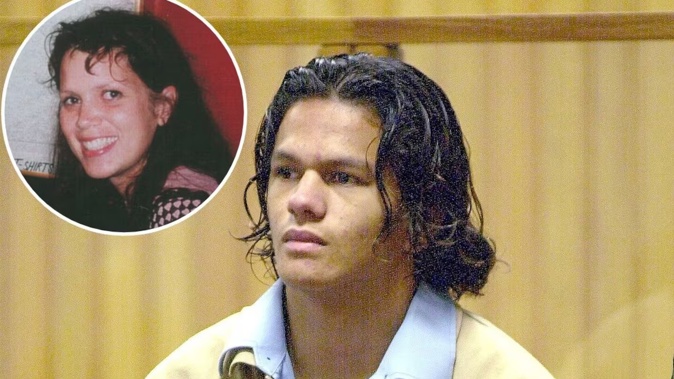
- John Michael Wharekura’s appeal against his murder conviction for killing Tanya Burr has been dismissed.
- Wharekura, who was 16 at the time, claimed his mental illness affected his guilty plea.
- The Court of Appeal found no evidence of insanity, noting his actions appeared rational and remorseful.
A murder victim’s mother is shocked the killer has tried to appeal his conviction more than 20 years later – and relieved he failed.
Teen killer John Michael Wharekura plunged a knife 15 times into pregnant Rotorua woman Tanya Burr in 2002.
Details about why John Michael Wharekura killed Burr – including that she was the same height as his stepfather, whom he wanted to kill – are contained in a Court of Appeal decision released today.
Wharekura applied to the Court of Appeal on March 31 for more time to appeal his conviction for the 2002 murder.
The appeal has been thrown out on several grounds, including doubts over his claims about his mental health state at the time and the fact his then lawyer, Harry Edward from Rotorua, had since died and all documents relating to the case had been destroyed.
Burr’s mother, Val Burr, said she was relieved Wharekura’s appeal attempt failed.
“I was shocked that the attempt was made in the first place.”
She said she was also shocked she was not made aware of the decision, learning about it through NZME.
Wharekura was 16 when he killed Burr at her Hilda St flat after knocking on her door and asking for a piece of paper and pen, supposedly to write a note for a friend in a neighbouring flat.
When the 21-year-old turned to get it, Wharekura went inside and stabbed her repeatedly.

John Wharekura, then aged 17, in court in 2003. Photo / NZME
He was arrested two days later, eventually pleaded guilty, and was sentenced to life imprisonment with 14 years without parole in 2003.
At the time, he was one of New Zealand’s youngest convicted killers.
It was revealed years later he had an undiagnosed psychosis.
He has since been in and out of prison, the community and secure mental health facility the Mason Clinic, where he was last ordered to be admitted in December 2023.
The appeal decision said that in 2002 and 2003 interviews to assess his mental health, Wharekura told a medical expert that at the time of the killing, he was angry with his stepfather.
The decision said the account matched what he told police two days after the killing – that he had urges to kill his stepfather.
Wharekura had said Burr was the same height as his stepfather and, when he saw her, he “snapped”.

Tanya Burr was 12 weeks pregnant with a baby boy when she was murdered by a teenage stranger. Photo / Supplied
The decision said that in the police interview, Wharekura broke down in tears and displayed significant remorse when relaying this information.
Wharekura’s explanation for why his appeal had come so late was that he was not aware the voices in his head were relevant to his conviction.
The decision said Wharekura’s appeal affidavit said he was very young when he started hearing voices and only told his mother, who told him it was part of his Māori culture.
Wharekura’s affidavit said the voices continued throughout his teenage years and, after he killed Burr, he said he was instructed by the voices not to speak about them.
It was only when he was diagnosed with schizophrenia in later years that he started talking about the voices.
Wharekura said he did not know his mental health was relevant and he had not previously received legal advice on the issue. He also did not know until recently that appealing his conviction was an option.
Wharekura’s new lawyer, Anoushka Bloem, told the Court of Appeal there were exceptional circumstances in Wharekura’s case and his decision to plead guilty was impaired by his mental illness at the time.
She argued that Wharekura later told a medical expert the voices in his head were telling him he should go to prison and should therefore plead guilty and not tell others about the voices. She said his mental illness was causing him to conceal his illness.
But the Court of Appeal found the evidence was inconsistent with Wharekura being insane at the time of the killing.
“It is true that the murder was irrational and senseless. Many murders are. But Mr Wharekura’s actions on the evening otherwise appear rational.”
The decision said Wharekura stole items of use to him, including Burr’s car, and there was evidence he interacted with people after the murder and appeared rational.
He appeared “calm and relaxed” in his police interview, detailing a coherent account of his actions and showing remorse.
The decision said Wharekura’s mental health was explored by experienced counsel Edward at the time, including in two reports from psychiatrists who found no evidence of psychosis.

Rotorua lawyer Harry Edward died in 2019. Photo / File
Edward died in 2019 and Wharekura’s case file had since been destroyed.
The decision said evidence of Edward’s observations of Wharekura, their communications, the advice he provided and the instructions Wharekura received were now unavailable – all matters that would prejudice the Crown if an appeal were allowed.
The decision was signed by Justices Campbell, Dunningham and Harvey.
Kelly Makiha is a senior journalist who has reported for the Rotorua Daily Post for more than 25 years, covering mainly police, court, human interest and social issues.
Take your Radio, Podcasts and Music with you









